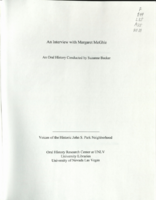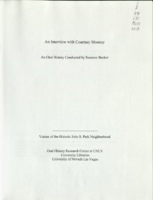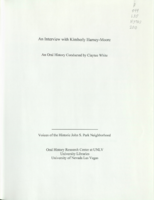Search the Special Collections and Archives Portal
Search Results

Transcript of interview with Margaret McGhie by Suzanne Becker, November 21, 2008
Date
Archival Collection
Description
Margaret McGhie was a Depression era child who grew up in western Nevada, where her grandparents were ranchers. Her mother, a native Nevadan, married an Italian immigrant, and she recalls moving a lot. Margaret attended a business college in Reno and eventually moved to Las Vegas, where she worked for Basic Magnesium (BMI) in Gabbs, NV and then later for a remanufacturing company where she verified rocket measurements. Only 16,000 people resided in Las Vegas in post World War II days when she moved there for work as her husband returned from military service. At the time lots for homes were selling in the new development of John S. Park. Using the GI bill the young couple became one of the first home owners on the street. The land had formerly been a ranch and orchard making it a beautiful spot. Due to post-war building material shortages it took nearly two years to finish the house construction. To this day Margaret lives in the home where she and husband raised four children. She recalls the neighborhood fondly and describes some of the activities that kept them busy, where they shopped, and how her children attended John S. Park Elementary School and then the local parochial schools. She describes how the town changed from a 10-minute cross-town drive and how the fact of living close to the Strip had little impact on their life. People moved from the neighborhood as the city grew, she says, moving to newer and nicer homes in Spanish Oaks and then Summerlin. The John S. Park neighborhood has changed from a formerly large Mormon demographic to a notable increase of Latino population. She sees the historic designation as a signal of pride in ownership for residents.
Text

Transcript of interview with Ruth Annette Mills by Lisa Gioia-Acres, November 20, 2008
Date
Archival Collection
Description
Ruth Annette Mills was born and raised in Washington, D.C. She recalls the early years during WWII, her father's cancer and radium treatment under Blue Cross Blue Shield, his passing when she was nineteen, and her marriage that same year. Ruth and her husband and family lived in Georgia, Texas, and Maryland before coming to Las Vegas in 1968. She worked as a typist for the Office of Education at one point and did volunteer work for her church, the Cub Scouts, and the League of Women Voters. She also worked as a clerk-typist for the Clark County School District, and eventually became a teacher through the Teacher Corps program. She graduated in 1975 and was hired to teach 6th grade at CVT Gilbert. The school integration program was just beginning when Ruth was first hired as a teacher. She held the position of facilitator and recalls how angry parents were when they learned their children had to be bussed to sixth grade centers. Having been involved through her church with the Civil Rights Movement in other states, she was disappointed with the racist attitudes she encountered in Las Vegas. Ruth's involvement with health care began when her daughter-in-law developed kidney stones and was denied treatment. In 1993 she started the Nevada Health Care Reform Project through the League of Women Voters in order to support Bill Clinton's health plan. Fifteen years later, over 100 organizations had come on board to support the League's coalition in favor of Clinton's plan, and her fondest wish is that one day Universal Health Care will be available to all Americans.
Text

Transcript of interview with Courtney Mooney by Suzanne Becker, July 30, 2007
Date
Archival Collection
Description
Courtney Mooney is the Urban Design Coordinator for the City of Las Vegas. Her job description includes a knowledge of historic preservation, which is her passion. In this interview she shares her professional and personal thoughts about John S. Park Neighborhood. She moved to John S. Park in 2002. As a professional she explains that "how I look at preserving neighborhoods or buildings, is more of a community preservation, not saving the individual building for the individual building's sake..." Courtney offers a big picture of the neighborhood's past, present and future. John S. Park, like so many other Las Vegas neighborhoods, was built during World War II and has been affected by history of segregation and the wave of changing demographics, and the work that went into the plan and requirements to be designated a historic neighborhood. Courtney provides a summary of the story about the land, its ownership and what lead to the foundation of the neighborhood: from John S. Park to George Franklin and John Law, to Mary Dutton and explains how the proposed development of the land differed from other communities being built to FHA standards and specifics that declared Las Vegas a Defense City in the 1940s. She lists the factors that made the neighborhood a logical and important target for the historic designation, a small neighborhood tucked away, that is "a snapshot of the types of people that were coming here," filled with community leaders, entrepreneurs, blue-collar and casino workers. She also mentions about the missed opportunity of the Las Vegas High School neighborhood for preservation while supporting the John S. Park designation.
Text

Transcript of interview with Kimberly Harney-Moore by Claytee White, June 16, 2010
Date
Archival Collection
Description
Kimberly Harney-Moore and her three siblings were raised in the John S. Park Neighborhood in the 1960s and 1970s. Their parents, Tim and Kathleen Hamey, were educators. A nostalgic feeling for the neighborhood remains; perhaps, rekindled when she had close friends buy a house across the street from her childhood home. In this interview, Kimberly talks about the inviting character of the area's architecture, mentions a few names of neighbors she babysat for, and fondly recalls her job at Luv-Its Custard shop. There was a time when she would drive through the old neighborhood and be saddened by the lack of upkeep and the changes, but today it is a place being reborn to a new generation. Note: Tim Harney and Kathleen Harney, Kimberly parents, are also participants in the Voice of the Historic John S. Park Neighborhood oral history project.
Text

Transcript of interview with Ellis Landau by Barbara Tabach, November 28, 2017
Date
Archival Collection
Description
In 1990, Las Vegas became home to Ellis Landau and his attorney wife, Yvette. They moved from Phoenix, Arizona when Ellis accepted a position as Executive Vice President and Chief Financial Officer with Boyd Gaming. The relocation also included a desire to become active in the local community. Temple Beth Sholom was one of their first connections. For Ellis the Jewish community of a newer city like Las Vegas differed immensely from his childhood upbringing in a more ethnic Jewish community outside Philadelphia. Nevertheless, Ellis soon became active on the Temple Beth Sholom board, and is a past Treasurer and President. The couple are among the founders of the Warsaw Memorial Garden at the synagogue. In 2006, Ellis was honored as Temple Beth Sholom’s “Man of the Year.” The Landaus have been significantly involved with other local organizations such as Nathan Adelson Hospice and the Las Vegas Philharmonic. Ellis’s dedication to the Anti-defamation League, both on a local and regional level, is a beacon of inspiration to others. The Landaus are sponsors of ADL’s “No Place for Hate” program. Ellis is a graduate of Brandeis University in economics and has a Masters of Business Administration from Columbia University School of Business. His former career steps include Ramada Inc. and U-Haul Corporation.
Text

Transcript of interview with Rabbi Felipe Goodman by Barbara Tabach, March 9, 2015
Date
Archival Collection
Description
Rabbi Felipé Goodman was born in 1967 and raised in an established Conservative Jewish community in Mexico City. This community would financially and emotionally support his seminary education was in New York City at the Jewish Theological Seminary. As a young rabbi eager for his own congregation, he became restless in 1998 and began his search for options which lead him to a listing for a rabbi at Las Vegas’s oldest synagogue, Temple Beth Sholom. During this oral history, Rabbi Goodman weaves a fascinating story of chance and good fortune of his interview process and visit to Las Vegas—including the generous parting gift of Snapple—and his surprising decision to take the position. Now, almost two decades later, he reflects on several of his accomplishments in addition to being Temple Beth Sholom’s longest serving rabbi to date. He mentions the opening of the synagogue’s move to a beautiful new building in Summerlin, where they were able to include a mikvah for conversions. He shares how he and Rabbi Jeremy Wiederhorn, formerly of Midbar Kodesh Temple, worked together to establish chevra kadisha for burying Jewish people. As a member of the Rabbinical Assembly he was especially please to help host the 2011 annual conference in Las Vegas after years of persuasion. Israeli political leader Tzipi Livni was the keynote speaker. Rabbi also speaks about his passion for Israel, AIPAC and the Conservative Movement in Judaism.
Text

Transcript of interview with Flora Mason by Barbara Tabach, December 8, 2014
Date
Archival Collection
Description
Flora Mason (1940- ) is a Las Vegas, Nevada philanthropist and community leader. She was born Florica Esformes to a Sephardic Jewish parents who emigrated from Greece to New York. This Mediterranean influence can be seen in the meals she serves for the Jewish holidays. Flora?s grandfather had a pushcart business in New York and her father became a produce broker, which led the family to Miami, Florida. She graduated from high school in Miami and also met Stuart Mason there. The young couple married in 1958. They had been married for 58 years when Stuart passed away in 2012. In this oral history, Flora recalls her life?from witnessing signage that read: no blacks, no dogs, no Jews in the South to meeting her husband while a teenager to raising her three children in Las Vegas. Along the way, she has always found time to form fast friendships and to inspire productive community organizations. v For example, Flora and Stuart founded the Las Vegas Chapter of the Juvenile Diabetes Foundation in 1970. It was a disease that their daughter Deborah had suffered from. They also established the Mason Undergraduate Peer Coach Program at University of Nevada, Las Vegas Libraries in 2006. Flora was the first woman elected by the general membership to serve on the Temple Beth Sholom Board of Directors. She has served on the National Board of Directors of the Juvenile Diabetes Research Foundation, been involved with the Jewish Federation of Las Vegas, the Anti-Defamation League among many other Jewish and non-Jewish community organizations. Flora?s college education began at the University of Miami and focused on completing both her undergraduate and graduate degrees at UNLV, where she majored in English literature. She then became a lecturer in the UNLV English department from 1985 to 1993. Flora and Stuart Mason had three children: sons William and James who joined the family?s successful three-generation commercial construction business Taylor International, and daughter Deborah. In this oral history, Flora shares the joy of being a grandparent, her love of travel, and the opportunities of meeting Israeli dignitaries over the years. She also candidly reflects on dealing with grief and the Jewish rituals surrounding death.
Text

Transcript of interview with Jackie Boiman by Barbara Tabach, March 27, 2015
Date
Archival Collection
Description
Jackie, n?e Brooks, Boiman was born in Brooklyn and raised in Levittown, New York. Although Jackie recalls her family?s Jewish observance as far less than strict, her religious connection began in the Levittown Jewish Center Sunday School and under the close relationship she had with her grandmother, who kept kosher and inspired her to do so. In her early twenties, Jackie worked in data reduction at Grumman Aerospace Corporation and the space program; was married and had her only child, Andee. After twelve years of marriage, Jackie divorced and relocated to Las Vegas, where her parents had moved earlier. In Las Vegas, job opportunities for a single mother were scant. Then after months of searching, she found her first job as a part time secretary for Temple Beth Sholom. Over the course of the next nearly fifteen years, Jackie would go on to work with almost every congregation and temple in Las Vegas, developing their youth programs and contributing to the growth of each one for 15 years. After a brief retirement, she had gone back to work as the first administration person for Touro University. In this interview, Jackie discusses at length her involvement with each of the temples, her experiences with being a single mother and living below the poverty line. She shares how her life has been changed through trials and tribulations but how her faithfulness and commitment to her mission had led her to the success she has today.
Text

Transcript of interview with Raymonde Fiol by Barbara Tabach, August 12, 2015
Date
Archival Collection
Description
In this interview, Fiol discusses her experience as a a hidden child in the Holocaust and her family's history. She also talks about her involvement with the Las Vegas Holocaust survivors group.
Raymonde "Ray" Fiol is president of the Holocaust Survivors Group of Southern Nevada. A Jewish Holocaust survivor whose parents were killed in Auschwitz, Fiol was hidden by a Christian family of Resistance fighters during her childhood in Nazi-occupied Paris, France. She married American serviceman Phil Fiol and left Paris in 1957. The couple lived in New York City where she worked in inventory control. She retired to Las Vegas, Nevada around 2003 and became active in the local Holocaust Survivors Group. In 2007, she became president of the organization, which provides essential services to Holocaust survivors and helps them share their stories. Fiol is also a member of the Nevada Governor?s Advisory Council on Education Relating to the Holocaust and the coordinating council of Shoah International. Her dedication to preserving the memory of the Holocaust and caring for survivors earned her the Nevada Senior Citizen of the Year award from the Nevada Delegation of the National Silver Haired Congress and the Aging Services Directors Organization in 2014, and in 2013 she was named Mensch Volunteer of the Year by the Jewish Federation of Las Vegas. In this interview, Ray reflects upon her traumatic childhood experiences, and shares how she learned details of her family?s history from a woman in France who had researched the destiny of the local Jewish community. She also discusses her involvement with the survivors group, and the positive impacts of its outreach activities, as well as goals to ensure future generations learn about, and from, the Holocaust.
Text

Transcript of interview with Andy Katz by Barbara Tabach, February 16, 2016
Date
Archival Collection
Description
In this interview, Andy Katz discusses his family, his childhood growing up in Las Vegas, and attending UNLV. His parents, Mike and Bea Katz, established Manpower, an employment agency, which Andy served as president.
Andy Katz is the youngest of four children born to Michael and Beatrice Katz. When Andy was a little over one-year-old his family moved from New York City to Las Vegas. During this oral history Andy highlights his family?s background and the entrepreneurial spirit of his father that inspired the move in 1963. By 1964, Mike Katz, Andy?s father, was well-known in Las Vegas for providing an answering service and subsequently for opening the Manpower franchise to serve the growing town. In time, this family business grew and the eldest sons, Bob and Mel opened franchises in Salt Lake City and San Diego, respectively. Andy recalls his steps to joining Manpower in this interview. With great humor and fondness, he describes the friendships he formed in public school, Hebrew school and Jewish youth organizations. Andy easily slipped into active leadership roles; it was a role he would continue during his years at UNLV, where he earned a Business degree and was active with the Alpha Epsilon Pi fraternity. Born Andrew Scott Katz on January 9, 1962, Andy, as everyone knew him, passed away suddenly on February 23, 2016. It was exactly one week after this oral history interview. The scheduled next session was not to occur.
Text
